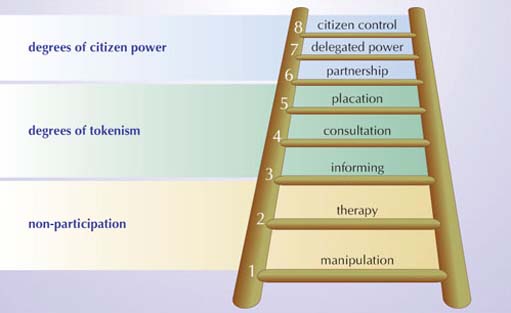3.3 Green governance needs citizens
The term ‘good governance’ implies that ‘ordinary people’ will be involved in deciding what to do, trying to make it happen, and deciding whether it has happened (debate, implementation, monitoring). But what, in practical terms, might citizen involvement in the governance of an issue such as climate change mean? Citizen involvement in decisions and actions can mean anything from filling in a questionnaire to joining a demonstration to sitting on a committee. One helpful approach is Arnstein's ‘ladder of citizen participation’(Figure 6). On the bottom rungs are well-known and long-practised techniques for keeping the public informed; on the top rungs, power has been handed over to the public.

Most commentators would say that there is a rather utopian feel to the higher rungs of the ladder of participation, and in the developed world there is little evidence of decisions being ceded by the state to citizens. In less-developed countries there are cases where the higher rungs are being reached, partly because governments have failed to deliver, and international NGOs and agencies are leapfrogging the state to give funds to communities to deliver sustainability on the ground.
The move from government to citizen participation in governance sounds like a good idea. Is there anything to be cautious about?
□ Institutions of democratic government can be fairly transparent, and it is intuitively clear what the relationship is between citizens and the state. The lines are not so clearly drawn with governance. It is more difficult to identify where power lies, corruption may occur, and citizens may not feel any more empowered. Conversely, extensive citizen involvement may cause paralysis in decision making. Worse from a climate change point of view: citizens may demand cheap car driving and air flights!
